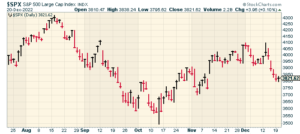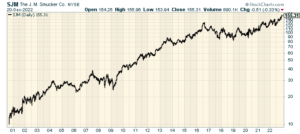CWS Market Review – December 20, 2022
(This is the free version of CWS Market Review. If you like what you see, then please sign up for the premium newsletter for $20 per month or $200 for the whole year. If you sign up today, you can see our two reports, “Your Handy Guide to Stock Orders” and “How Not to Get Screwed on Your Mortgage.”)
Before we get to today’s issue, let me remind you that we will unveil the 2023 Buy List one week from today. As usual, the Buy List will have 25 stocks. Five new names go into the Buy List and five old names will come out.
This will be the 18th year of our Buy List. In honor of the new Buy List, the stock market will be closed on Monday, December 26. The 2023 Buy List won’t go into effect until Tuesday, January 3, which is the first trading day of the year.
This looks to be a very good year for our Buy List in terms of relative performance. Since April, we’ve outperformed the overall stock market by a nice margin. I’ll have full details on our 2022 performance in upcoming issues.
The Stock Market’s Lousy December
Unfortunately, the stock market has been somewhat sluggish this month. Today, the S&P 500 snapped a four-day losing streak with a gain of just 0.1%. Earlier this month, the index compiled a five-day losing streak.
Until December, the S&P 500 had been recovering well since the low in mid-October. It seems like every time the stock market gets going, it stumbles to another new low. Was that just another bear-market rally?

It’s too early to say, but there’s been a crucial difference between the market in December and previous pullbacks, and that’s the strength of the bond market. Interest rates, especially at the long end, have gradually slumped lower over the past few weeks. On November 9, the 30-year Treasury yielded 4.31%. It’s recently ticked below 3.5% (although it’s up to 3.7% now).
The paring of high bond prices and lower stocks is often taken as the market preparing for a recession. That may be a prudent decision. There are lots of reasons to believe the overall economy may slow down next year, or even fall into a recession.
Bloomberg recently surveyed economists and found that 70% of them expect a recession next year. That’s double the number from a similar survey in June. The economists see the U.S. economy expanding by a measly 0.3% next year.
They’re not alone. In September, the Federal Reserve was expecting the U.S. economy to grow by 1.2% next year. Last week, the Fed lowered that forecast to growth of just 0.5%. I don’t think the economy will fall off a cliff, but it’s wise to expect a modest slowdown. The economy had a mild slowdown in 2015-2016 without going into a recession.
The housing market is already feeling the squeeze. Today we learned that housing starts fell by 0.5% last month to an annualized rate of 1.43 million. Single-family homebuilding fell to its lowest rate in more than two years.
The outlook may not improve soon. Applications to build fell by 11.2% and permits to build single-family homes dropped by 7.1% to their lowest level since 2020. Housing in some areas of the country is pretty ugly. Bill McBride points out that home sales in California are down 48% over the last year. Homebuilder confidence fell to 31 last month from 33 the month before. Any number below 50 means the homebuilders are pessimistic.
Another place where we see pessimism is on Wall Street. Analysts have been cutting back their earnings forecasts. At the middle of the year, Wall Street was expecting the S&P 500 to report Q4 earnings of $60.46 per share (that’s the index-adjusted number). Since that time, the Q4 forecast has been ratcheted back to $53.91 per share. That’s a decrease of more than 10% in less than six months. That also helps explain the recent behavior of stocks and bonds.
For all of 2023, Wall Street had lowered its forecast by 8% since the summer. The full-year 2023 forecast is now down to $227.17 per share from $249.01 per share this summer.
If those forecasts are accurate (which is a big if), then it means that the stock market is reasonably priced. The S&P 500 is currently going for just under 17 times next year’s earnings estimate. That’s not bad, especially if the Fed keeps rates steady for much of this year.
This has been an unusual year for the stock market, and it may be one of the worst years in decades for an old stand-by portfolio. I’m speaking of the 60/40 Portfolio. That means a portfolio that’s 60% in stocks and 40% in bonds.
For many years, the 60/40 Portfolio has represented the optimal well-balanced portfolio. It’s not that this portfolio performed the best but rather that it performed the best relative to its volatility. According to Vanguard, the 60/40 Portfolio has gained an average of 8.8% per year for nearly 100 years. Owning the 60/40 Portfolio meant you could sleep well at night.
That is, until this year. In normal times, stocks and bonds tend to move in opposite directions which has meant that the right combo of the two would balance each other out. Investors got growth with stability.
Thanks to inflation and higher interest rates, both stocks and bonds moved lower for much of this year. As a result, the 60/40 split didn’t do much to help you. Both were losers. The failure of the 60-40 this year has shocked many investors. It was assumed that a 60-40 portfolio could never have a really bad year, but it happened. One of the lessons for investors is that so-called extreme events happen more often than you think.
There really isn’t a substitute for owning high-quality stocks. Speaking of which, let’s look at a stock that’s been an all-star, until about five years ago.
Stock Focus: J.M. Smucker
“With a name like Smucker, it has to be good.” So said the old slogan for J.M. Smucker (SJM). I’m not sure why a name would cause anyone to discount the seriousness of a business enterprise, but the famous slogan certainly worked.
For over 120 years, Smucker has kept America fed with its high-quality brand names. If you’re inclined to think Smucker is just jelly, allow me to disabuse you of that notion. Of course, it owns Jif peanut butter as well.
Ok, it’s more than PB&J as well.
In fact, there’s an entire stable of brand names that Smucker owns. This company owns Crisco and Knott’s Berry Farm. The Dunkin’ Donuts brand is also licensed to Smucker to sell coffee at the retail level. Coffee is a big part of their business. Smucker also owns Folgers.
It doesn’t end there. Smucker has an entire pet food division to make sure Rover gets fed. Smucker owns Meow Mix, 9 Lives and Milk-Bone. Both Folgers and Milk-Bone are the top brands in the U.S. Smucker also owns Uncrustables, a personal favorite. About 95% of the company’s sales come from the United States. Smucker also used to be a Buy List stock for three years, from 2017 to 2019.
Check out this long-term chart:

You’ll notice that while Smucker has been a long-term winner, it hasn’t done so well lately. Since the middle of 2016, the S&P 500 has more than doubled, including dividends, but SJM is only up by about 20%.
What happened? Well, the company made a few ill-advised acquisitions that didn’t turn out as well as planned. I can’t help but think of Peter Lynch’s observation that too much cash on a firm’s balance sheet is not a good thing because it forces them to do something dramatic and unwise. Lynch referred to this as the Bladder Theory of Corporate Finance. In particular, Smucker’s premium dog food biz has not been a winner.
Today, Smucker’s current market value is just over $16 billion. That’s a good-sized company, and I have strong hopes for the company.

The last earnings report came out on November 21, and it was quite good. Smucker earned $2.40 per share for its fiscal Q2. That beat the Street by 21 cents per share. This was for three months ended in October.
I was also impressed to see Smucker increase its full-year guidance. The company now sees earnings ranging between $8.35 and $8.75 per share. That’s an increase of 15 cents per share to both ends of its guidance.
“Our second quarter results reflect the ongoing strength of our business, continued demand for our leading brands, and the ability of our team to execute with excellence,” said Mark Smucker, Chair of the Board, President and Chief Executive Officer. “We delivered organic top-line growth across all of our businesses, driven by the strength of our portfolio, and our ability to recover cost inflation and manage our supply chain environment.”
The next earnings report will be out in late February. Wall Street expects $2.12 per share. That’s a decrease over the $2.33 Smucker earned in the same quarter one year ago. Smucker currently pays a quarterly dividend of $1.02 per share. That works out to a yield of 2.6% which isn’t bad.
Smucker is an attractive buy at this price. It won’t be a giant winner for you but it could prove to be a consistent performer in your portfolio. It’s one of the best consumer staples stocks. Smucker has increased its dividend every year for the last 25 years in a row.
That’s all for now. I’ll have more for you in the next issue of CWS Market Review.
– Eddy
P.S. If you want to learn more about the stocks on our Buy List, please sign up for our premium service. It’s $20 per month, or $200 per an entire year.
Posted by Eddy Elfenbein on December 20th, 2022 at 6:51 pm
The information in this blog post represents my own opinions and does not contain a recommendation for any particular security or investment. I or my affiliates may hold positions or other interests in securities mentioned in the Blog, please see my Disclaimer page for my full disclaimer.
-
-
Archives
- April 2025
- March 2025
- February 2025
- January 2025
- December 2024
- November 2024
- October 2024
- September 2024
- August 2024
- July 2024
- June 2024
- May 2024
- April 2024
- March 2024
- February 2024
- January 2024
- December 2023
- November 2023
- October 2023
- September 2023
- August 2023
- July 2023
- June 2023
- May 2023
- April 2023
- March 2023
- February 2023
- January 2023
- December 2022
- November 2022
- October 2022
- September 2022
- August 2022
- July 2022
- June 2022
- May 2022
- April 2022
- March 2022
- February 2022
- January 2022
- December 2021
- November 2021
- October 2021
- September 2021
- August 2021
- July 2021
- June 2021
- May 2021
- April 2021
- March 2021
- February 2021
- January 2021
- December 2020
- November 2020
- October 2020
- September 2020
- August 2020
- July 2020
- June 2020
- May 2020
- April 2020
- March 2020
- February 2020
- January 2020
- December 2019
- November 2019
- October 2019
- September 2019
- August 2019
- July 2019
- June 2019
- May 2019
- April 2019
- March 2019
- February 2019
- January 2019
- December 2018
- November 2018
- October 2018
- September 2018
- August 2018
- July 2018
- June 2018
- May 2018
- April 2018
- March 2018
- February 2018
- January 2018
- December 2017
- November 2017
- October 2017
- September 2017
- August 2017
- July 2017
- June 2017
- May 2017
- April 2017
- March 2017
- February 2017
- January 2017
- December 2016
- November 2016
- October 2016
- September 2016
- August 2016
- July 2016
- June 2016
- May 2016
- April 2016
- March 2016
- February 2016
- January 2016
- December 2015
- November 2015
- October 2015
- September 2015
- August 2015
- July 2015
- June 2015
- May 2015
- April 2015
- March 2015
- February 2015
- January 2015
- December 2014
- November 2014
- October 2014
- September 2014
- August 2014
- July 2014
- June 2014
- May 2014
- April 2014
- March 2014
- February 2014
- January 2014
- December 2013
- November 2013
- October 2013
- September 2013
- August 2013
- July 2013
- June 2013
- May 2013
- April 2013
- March 2013
- February 2013
- January 2013
- December 2012
- November 2012
- October 2012
- September 2012
- August 2012
- July 2012
- June 2012
- May 2012
- April 2012
- March 2012
- February 2012
- January 2012
- December 2011
- November 2011
- October 2011
- September 2011
- August 2011
- July 2011
- June 2011
- May 2011
- April 2011
- March 2011
- February 2011
- January 2011
- December 2010
- November 2010
- October 2010
- September 2010
- August 2010
- July 2010
- June 2010
- May 2010
- April 2010
- March 2010
- February 2010
- January 2010
- December 2009
- November 2009
- October 2009
- September 2009
- August 2009
- July 2009
- June 2009
- May 2009
- April 2009
- March 2009
- February 2009
- January 2009
- December 2008
- November 2008
- October 2008
- September 2008
- August 2008
- July 2008
- June 2008
- May 2008
- April 2008
- March 2008
- February 2008
- January 2008
- December 2007
- November 2007
- October 2007
- September 2007
- August 2007
- July 2007
- June 2007
- May 2007
- April 2007
- March 2007
- February 2007
- January 2007
- December 2006
- November 2006
- October 2006
- September 2006
- August 2006
- July 2006
- June 2006
- May 2006
- April 2006
- March 2006
- February 2006
- January 2006
- December 2005
- November 2005
- October 2005
- September 2005
- August 2005
- July 2005
 Eddy Elfenbein is a Washington, DC-based speaker, portfolio manager and editor of the blog Crossing Wall Street. His
Eddy Elfenbein is a Washington, DC-based speaker, portfolio manager and editor of the blog Crossing Wall Street. His